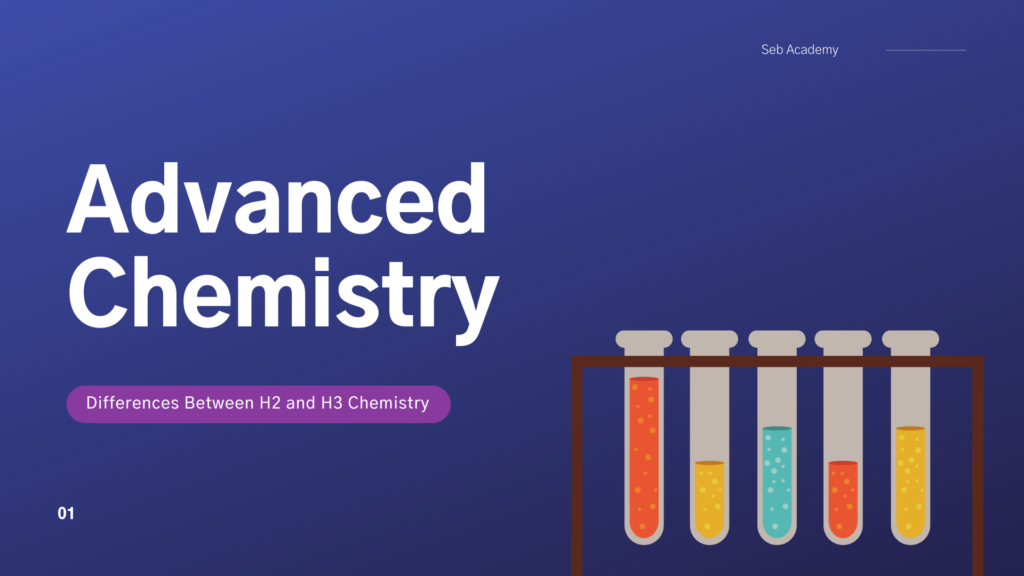
Differences between H2 and H3 chemistry
Compared to what the O Levels offers, A Level H2 and H3 Chemistry covers a broader range of topics, including a more in-depth exploration of contents. The syllabus’s goal is to put less emphasis on the factual content and more focus on the interpretation and implementation of scientific concepts and values. A significant part is an experimental work, too. Students would need to grasp scientific understanding, show research investigation skills and link science and society, which are the sciences’ activities. Now with so much content examined for the A Levels, be it H2 or H3 Chemistry, how do we excel in it? To achieve academic excellence, one important step to take is to address the differences between the subjects before committing to the academic endeavour.
This article is prepared to shed more light on the differences between H2 and H3 A-Level Chemistry.
COMPARING H2 AND H3 SYLLABUS
The H2 Chemistry covers significantly more topics in numbers than its H3 counterpart which focuses on more comprehensive, deeper understanding and practical applications of scientific principles. H2 Chemistry students get to know these topics, accompanied by frequent practical sessions throughout their school calendar year.
H3 Chemistry
H3 Chemistry is only available to students who have obtained good grades during their first years in JC, as such H1 & H2 is a needed prerequisite before pursuing H3.
Instead, the students select different programs to pick from, including either undergraduate modules or extended, in-depth research.
The topics offered at these two levels differ in range as well as individual depth. Listed below is a table list of topics covered at H2 & H3 Chemistry advanced level.
TOPICS COVERED AT EACH A-LEVEL (FROM SEAB)
|
H2 CHEMISTRY 9729 SYLLABUS TOPICS |
H3 CHEMISTRY 9813 SYLLABUS TOPICS |
| Atomic Molecules & Stoichiometry | Molecular Orbital Theory |
| Redox | UV- Vis spectroscopy |
| Atomic Structure | IR Spectroscopy |
| Chemical bonding | NMR spectroscopy |
| The gaseous state | Mass spectrometry |
| Energetics | Advanced stereochemistry |
| Entropy, Gibbs free energy | Kinetics & Thermodynamic controls |
| Kinetics | Advanced Reaction Mechanism |
| Equilibrium | |
| Acid-Base Equilibria | |
| Titration curve | |
| Solubility Product | |
| Electrochemistry | |
| Introduction to Organic Chemistry | |
| Alkane | |
| Alkene | |
| Arene | |
| Halogen Derivatives | |
| Hydroxyl Compounds | |
| Aldehyde & Ketones | |
| Carboxylic acid & Derivatives | |
| Organic nitrogen compounds | |
| Period 3 elements | |
| Group 2 elements | |
| Group 17 elements | |
| Transition metals |
H2 CHEMISTRY SCHEME OF ASSESSMENT
A good score in H2 chemistry A-Level guarantees admission into Medicine, Dentistry, (also requires another H2 science course), Chemical Engineering, Pharmacy, Food Science, Environmental Engineering and Chemistry. The list may not be exhaustive. Therefore, a student that wants to take it will sit for four papers as illustrated below:
| PAPER | PAPER TYPE | DURATION | MARKS | WEIGHTING % |
| 1 | Multi-choice | 1 hour | 30 | 15 |
| 2 | Structured questions | 2 hours | 75 | 30 |
| 3 | Free-response questions | 2 hours | 80 | 35 |
| 4 | Practical | 2hr 30mins | 55 | 20 |
H2 paper 1 consists of 30 mandatory multiple-choice questions. You get a variable number of compulsory standardized questions in exam paper 2. On the question paper, you must write the answers.
H2 has paper 3, whereas H3 does not have. You have two hours to finish the exam on paper 3. There are also parts A and B of the test. You have 3-4 free-response questions in section A, and all are compulsory. There are 15-25 marks for each exam question. You have two questions in section B, but only pick one worth 20 marks.
Finally, H2 also has a practical paper. The exam takes two hours and thirty minutes and is worth 55 marks. This platform enables the ideas, formulas, equations, & calculations you have mastered to apply.
Papers 1, 2 and 3 test your knowledge and ability to manage, implement, and analyze information comprehensively. Paper 4, on the other hand, tests your practical skills and investigation.
H3 SCHEME OF ASSESSMENT
The A Level H3 Chemistry takes extra effort to pass, let alone score a distinction. Students who have passed the H2 stage and wish to understand better chemistry should go for it. The duration for H3, is a year, that is, at Junior College in the second year. The syllabus is also an extension of the chemistry of H2.
H3 chemistry, however, offers you a rewarding and satisfying experience with the subject. If you achieve excellent results, it adds value to your resume. Besides, it provides you with more chemistry knowledge that applies to professions related to the course.
Compared to H2, the H3 paper is a special-structured exam. You have only 2 hours and 30 minutes to sit for the H3 exam with 100 marks. The paper consists of two sections, A and B with a maximum of 60 marks in section A, while section B has 40. You also have a variable number of free-response compulsory questions in section A. There are 1 or 2 stimulus-based questions as well.
There are three free-response questions for Section B. Students will pick two exam questions containing 20 marks each. The paper tests, with understanding, your knowledge. Furthermore, H3 chemistry tests the ability to handle, apply and evaluate information.
Conclusively, it is worthy to note that A Levels Chemistry does not build on your knowledge of O levels or from the IP program, be it at the H2 or H3 level. However, performance largely depends on consistency and efforts while studying for the subject. While both H2 and H3 tests extensively on applications and deductions, H3 offers an in-depth study, which rewards the diligent with a worthy resume for further studies and scholarship application.
At Seb Academy, our H2 J1 and J2 classes are taught by Mr Lee. Mr Sam Lee has a wealth of experience in teaching A Levels Chemistry. As a senior teacher at Hwa Chong Institution, he was a highly popular lecturer who found his lessons efficacious in explaining difficult concepts while forming good connections between topics. Mr Lee was instrumental in mentoring many new teachers and provided them with useful teaching techniques for effective lessons. Click here to view more information on his profile page. Click here to view our latest H2 Class schedule.

